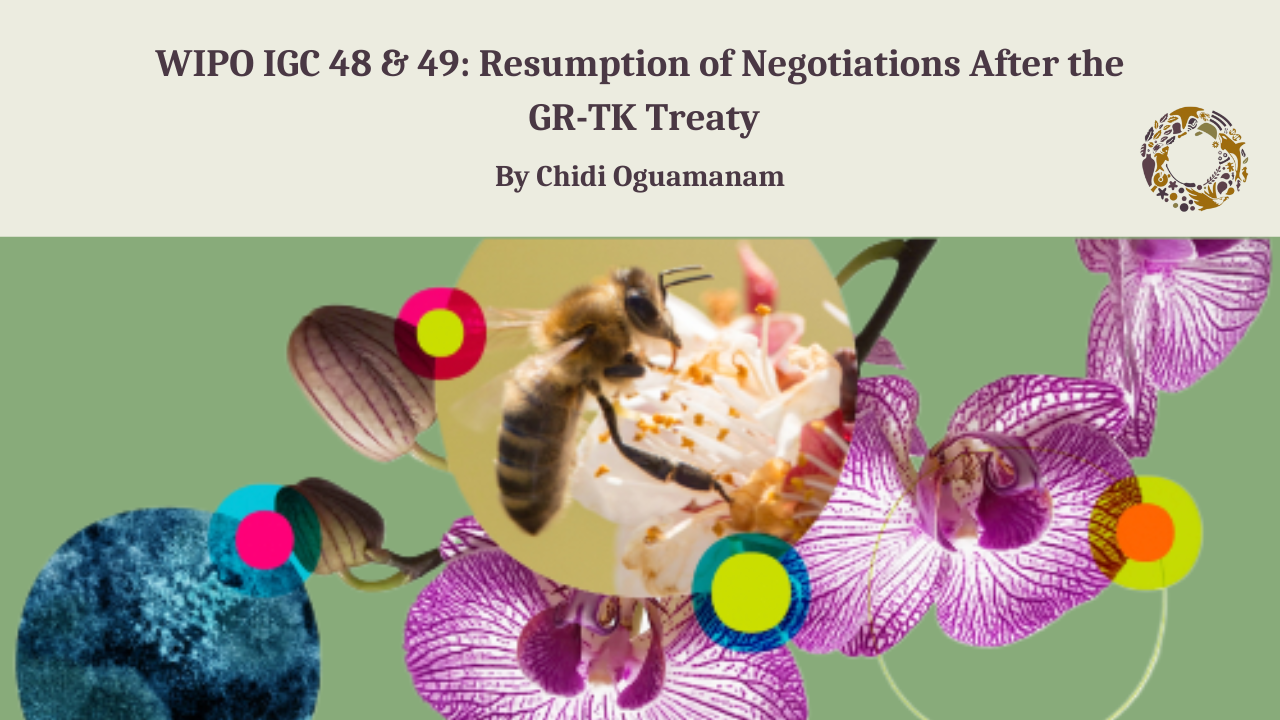WIPO IGC 48 & 49: Resumption of Negotiations after the GR-TK Treaty
November 29-December 6 – In Geneva, experts, diplomats and many stakeholder delegations have resumed negotiations at the WIPO Intergovernmental Committee on Intellectual Property and Genetic Resources, Traditional Knowledge and Traditional Cultural Expressions (IGC). The last meeting of the IGC was held as a Diplomatic Conference that climaxed in the first treaty from the special committee – the Treaty on Intellectual Property and Traditional Knowledge Associated with Genetic Resources in May 2024.
The reconvened meeting is under the auspices of the IGC 48th and 49th Sessions in accordance with the remaining part of the IGC’s 2024-25 biennium calendar.
IGC 48 on Stocktaking
The 48th session held today, November 29. It is tasked with taking “stock of the progress made on genetic resources and traditional knowledge associated with genetic resources and discuss any issues arising from the diplomatic conference”.
Pursuant to this session, some delegations including group coordinators expressed continuing enthusiasm over the significance of the traditional knowledge and genetic resources treaty. A few delegations provided indicative details of preliminary national efforts and processes being taken to sign the treaty. Other delegates harped on specific provisions of the treaty regarding the requirement for transparency over the interface of genetic resources and traditional knowledge in the patent process. On a different note, some other delegations emphasized aspects of the treaty that relate to how to deal with emerging issues, especially those regarding Digital Sequence Information (DSI). Even though DSI is not dealt with in the treaty, it is potentially within its radar for future revisions. Yet other delegations reported on the intersection of the treaty with developments at the Convention on Biological Diversity, especially DSI – an increasingly cross-cutting issue which featured at the COP 16 in Cali, Columbia.
On an entirely different dimension, Canada emphasized its early concern communicated to WIPO the same date the treaty was signed. The concern was regarding the urgency for authentication of the treaty text and release/publication of official text of the adopted treaty in official languages to enable adequate interpretation to better understand the ramifications of the treaty.
Finally, some delegations and segments of the Indigenous Caucus expressed disappointment with the recently concluded Riyadh Design Law Treaty. Not only were Indigenous Peoples not represented in Riyadh, they further argued that the treaty falls short of mandatory disclosure of the use of traditional knowledge in industrial designs against the expectation of Indigenous Peoples and many in the developing countries. It is clear that the policy space for the requirement “of other information, including information on traditional cultural expressions and traditional knowledge, of which the applicant is aware, that is relevant to the eligibility for registration of the industrial design” provided under Article 4(2) of the Riyadh Design Law Treaty falls short of the expectations on mandatory disclosure.
IGC 49 – Back to TK and TCEs Text(s) in Search of Options
In the 49th session scheduled for December 2-6; members will focus their negotiation energy on the remaining subject matters of the IGC. The session’s mandate is to “undertake negotiations on traditional knowledge and traditional cultural expressions with a focus on addressing unresolved issues and cross-cutting issues and considering options for a draft legal instrument(s)”.
At the last session on TC/TCEs, (46th IGC, February 2023) delegates for the first time attempted to negotiate TK/TCEs in a juxtaposed format. Meanwhile, the then Chair of IGC (Jamaica’s Lilyclair Bellamy) raised a zero draft single consolidated text for TK/TCEs at the 45th session (WIPO/GRTKF/IC/45/CHAIR’S TEXT). This document was revised on May 26, 2023 and issued as a second draft non-paper. One of the major heavy lifting delegates may have to deal with ithe question of options for single or two separate track negotiation pathways for the TK/TCEs text(s).
Meanwhile, Erika Watanabe Patroita (Brazil) and Anna Vuopala (Finland) were elected co-chairs, and conducted the brief 48th session. In a circuitous juggling of chairs, while Finland was elected the substantive Chair of the 49th session (with Brazil as Vice Chair); Brazil was elected to the Chair of the March 2025 50th session (with Finland as the Vice Chair). Also elected for the role of Vice Chairs over the remainder of the 2024/2025 biennium were Audrey Naeequaye (Ghana) and Alhanoof Aldebasi (Saudi Arabia).
With the 48th session concluded, delegates have their work cut out for them on how to move the IGC forward on the remaining subjects of traditional knowledge and traditional cultural expressions. It remains to be seen whether the May 2024 genetic resources and traditional knowledge treaty will serve as a good momentum for the ensuing deliberations. The same is true regarding nature of the effect, if any, the Riyad Design Law Treaty would have on the resumed focus on traditional knowledge and traditional cultural expressions.






